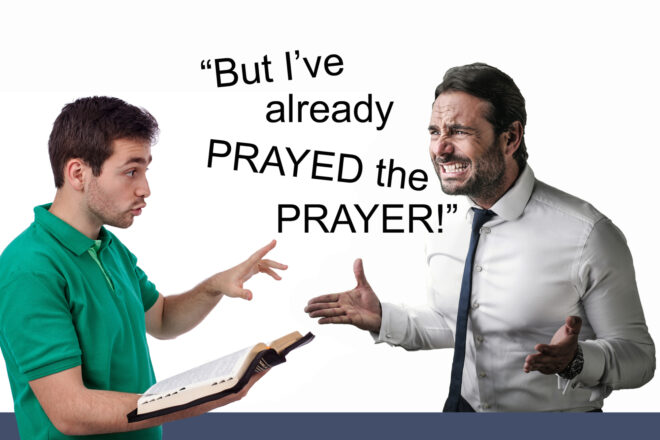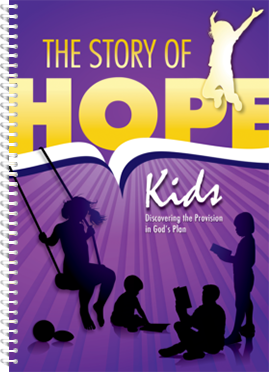Gotta Pray the Sinner’s Prayer?

I once ministered in a town where it seems that almost everyone, at some time or another, had “prayed the prayer”—the so-called “sinner’s prayer.” Yet, very few of these people demonstrated any evidence of a genuine Christian life.
Often when I shared the gospel with them, they would say: “But, I’ve already done that. I prayed the prayer!” And some would add, “But, it didn’t work for me.”
If “praying the prayer” does not save a person, what does?
As I was thinking about this a few years ago, I began to wonder—How many things are sinners told, by some Christians, to do in order to be saved. I came up with a list of 50, including these:
- Get right with God.
- Repent of your sins.
- Give your heart to Jesus.
- Make your peace with God.
- Reach out to Jesus.
- Turn to the Lord.
- Ask Jesus to come into your heart.
- Confess your sins to God.
- Call upon the Lord.
- Make a decision to follow Jesus.
Then, there’s the ever popular, “Just bow your head and pray this prayer” or “Bow your head and repeat after me.”
And there are more very sincere “how to be saved” directions given frequently. For the complete list, download the document, “What Must I [Really] Do to Be Saved?”
Please understand, I am NOT saying that all of these evangelistic instructions are wrong per se. But, I do think that in general they are unclear, confusing, and tend to be somewhat superficial and shallow, causing some unbelievers to remain unbelievers and others to think they are saved when they are not.
At the end of The Story of Hope, Good Soil Evangelism and Discipleship’s evangelistic Bible study workbook, page 60 is titled “A Personal Faith Response.”

After leading an unbeliever through 40 events in the Bible’s story of redemption as well as the Chronological Bridge to Life, it is time to encourage and Biblically persuade her/him to trust Jesus as personal Savior.
The Personal Faith Response page begins by helping your unbeliever-friend to personalize the meaning of John 3:16, which summarizes all she has learned about God’s redemptive story in the previous pages of the study. Then, in the middle of page 60, we have included these brief statements which concisely summarize key Biblical truths that are essential to the gospel, as well as sincere Biblical faith:
If a person can sincerely state these things, what else does she need to do?
If your friend, whom you have taken through a thorough study of God’s redemptive story and clarified and personalized that story by using the Chronological Bridge to Life, can sincerely say: “Yes, these statements are true of me!” “I am now trusting Jesus alone for my salvation.,” what else does she need to do to be saved?
“Trusting Jesus Christ” is faith, the kind of faith mentioned in Ephesians 2:8 – “For by grace you are saved through faith.” If your friend is sincerely trusting Jesus for salvation, there is nothing else she needs to do to be saved! Yes, there are discipleship steps she needs to pursue to be a committed Christ-follower, but her salvation is set and sealed if she has truly “believed,” as taught in the Bible.
John 3:16 For God so loved the world, that he gave his only begotten Son, that whosoever believeth in him should not perish, but have everlasting life.
What about "the prayer"?
I was teaching a seminar to a group of missionaries some years ago, during which this issue surfaced vehemently. When I explained the Personal Faith Response page, one older missionary shouted out, “But what about the prayer, where’s the prayer?”
Unfortunately, “the sinner’s prayer” has become, for a lot of Christians, much like a magical incantation. Whereas, the Bible is clear that salvation comes when a sinner, from the heart, trusts (or sincerely believes or puts faith in) Jesus Christ as Savior. So, salvation is not about “the prayer”—it’s about from-the-heart faith in Jesus.
Again, please understand: There’s nothing wrong with using “the sinner’s prayer” in evangelism, as long as you make it very clear that the prayer is ONLY an expression of personal faith and it is NOT the prayer that saves. If your friend assures you that she is sincerely trusting Jesus, another prayer alternative is to ask her to pray to thank God for the salvation God has given her.
What about Romans 10:13?
In discussing this issue, people often ask about Romans 10:13: “Does this verse not require that sinners call upon the name of the Lord in prayer to be saved?”
We need to understand the immediate context of Romans 10:13, as well as its connection to a more remote context. This verse is at the heart of Paul’s discourse about Israel’s unbelief and the benefits granted to Gentiles because of Israel’s unbelief. Romans 10:13 is a quotation from Joel 2:32, which points to the future “great and dreadful day of the Lord” when “everyone who calls on the LORD will be saved.” In Romans 10, Paul made a present application of Joel’s statement and emphasized the “everyone” part of the statement—God (even now) accepts everyone—both Jews and Gentiles—who call upon him. But what did Paul mean by “calls on the name of the Lord?”
We need to look again into the remote historical context of Romans 10, the Old Testament. That phrase was used commonly in the Old Testament to describe the act of worshipping the LORD. For example, in the days of Enosh, son of Seth, “men began to call on the name of the LORD” (Genesis 4:26). Abraham “built an altar to the LORD and called on the name of the LORD” (Genesis 12:8). In the Old Testament the two divisions of mankind were thought of as (1) those who worshiped the LORD and (2) those who did not. Today we often think of these divisions as “the saved” (or saints) and “the lost” (sinners). Paul himself used the “call on the Lord” expression in the New Testament to describe genuine God-worshippers in 1 Corinthians 1:2 and 2 Timothy 2:22, not as a “sinner’s prayer,” as that term has come to mean by many.
1 Corinthians 1:2 Unto the church of God which is at Corinth, to them that are sanctified in Christ Jesus, called to be saints, with all that in every place call upon the name of Jesus Christ our Lord....
2 Timothy 2:22 Flee also youthful lusts: but follow righteousness, faith, charity, peace, with them that call on the Lord out of a pure heart,
In verses 11-12 of Romans 10, Paul was emphasizing that anyone, a Jew or a Gentile, can become a true worshipper of Israel’s Jehovah God (can be saved).
Romans 10:11-13 For the scripture saith, Whosoever believeth on him shall not be ashamed. For there is no difference between the Jew and the Greek: for the same Lord over all is rich unto all that call upon him. For whosoever shall call upon the name of the Lord shall be saved
Decision or Faith Response?
We do not recommend using the word “decision,” with regard to this step of faith. Yes, there is a decision, a choice, but we believe that the term “faith response” is clearer and Biblically more accurate. “Decision” tends to suggest simply a mental act, whereas “faith response” suggests something that comes from a person’s heart. And “make a decision” as an evangelistic expression has been so widely misused, it is probably best to avoid it.
But what about repentance?
A question often asked is “What about repentance?” “You don’t mention repentance!”
This is a very good and important question that we will address in the following article in this series. Stay tuned!
Learn more about The Story of Hope and other similar resources.



Previous articles in this series:
- Three Greek Verbs Define Good Soil
- Assessing Unbeliever’s Gospel Understanding
- Assessing Gospel Receptivity
- Initial Contact or Relational Evangelism—or Both?
- The Problem of Gospel Static
- One Gospel - Three Worldviews
- Worldview “Noisy” Neighborhoods
- How To Understand Worldviews: I’m an Onion – You’re an Onion
- How To Witness to A Non Believer: 3 Step Guide To Using Verbal & Non Verbal Communication
- Gospel Knowledge Deficiencies
- The Romans Road in “Post-Christian” North America?
- Gospel Tracts in “Post-Christian” North America?
- Evangelism that BEGINS with Jesus – Good or Not So Good?
- Explaining the Gospel – Where Did Jesus Begin?
- Change the Way We Do Evangelism in North America?
- Evangelism – For the Biblically Uninformed
- A Distinctive Evangelistic Bible Study Workbook
- How Many Stories in the Bible?
- Eight Words Summarize the Bible’s BIG Story



